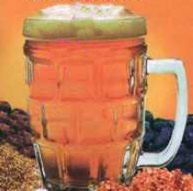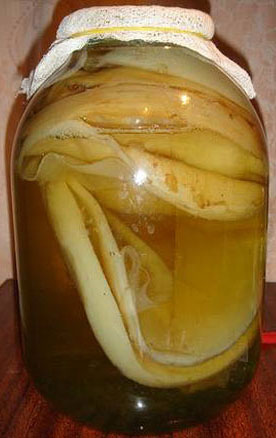Category: "Beverages"
Водка
The Russian word for vodka is водка, and the dimunitive is водочка. So when when he offers you a bit of vodka, a Russian might say «Не хочешь водочки?» Vodka is so associated with Russian culture that doubtless we will blog on the subject many times.
There are many jokes about Russians and vodka. Here is a representative one:
|
— Папа, Папа, говорят, водка подорожала, теперь ты бросишь пить? — Нет, сынок, теперь ты бросишь есть. |
"Daddy, they say that vodka has gotten real expensive. Are you gonna stop drinking?" "No, sonny. You're gonna stop eating." |
The Russians have an amusing tradition of making rhymes about all sorts of things. I remember in 1986 when I first went to Russia, Gorbachev raised the price of vodka in order to dissuade Russians from drinking excessively. (In this he was following the example of the short-lived Andropov.) I remember my buddy Алёша quoting the following to me:
| Если будет двадцать пять | If [vodka] gets to twenty-five [rubles per liter] |
| Будем Зимний опять брать | We will storm the Winter Palace again. |
| Если будет больше | If it gets to more, |
| Сделаем как в Польше. | We will do the same thing they did in Poland. |
By "the same thing they did in Poland," they meant the uprising by Solidarity.
The Russians have a thousand stories about the power of vodka. One of them is that vodka foot baths can help eliminate foot odor. The MythBusters tested this hypothesis, and to my great surprise pronounced it true. Mind you, they were washing the feet in vodka, not drinking it. There have been a couple episodes where they explore other vodka stories as well.
Квас

Квас is a very popular Russian drink. It is a mildly fermented alcoholic beverage made from rye bread or berries and yeast. Because this drink has very low alcohol content (1%), it is considered acceptable for children to drink. It is often flavored with fruits фрукты and herbs травы such as strawberries клубника and mint мята. This drink can be bought at the store or made at home. As a child, I loved drinking квас and my mother was a professional at making this drink.
I remember an unfortunate day when I tried to help my mom make квас. I wanted my mom to see that I could be a very good helper so I decided to prove this. I came up to my mom and asked her «Mама, можно я помогу тебе сделать квас?» “Mama, can I help you make квас?” My mother smiled at me and said «Конечно, моя дорогая!» “Of course, my dear!” I tried to show my mom that I was a big girl and could handle carrying one of the large jars of liquid to the table. While my mother left the kitchen, I quickly tried to move the heavy jar and to my surprise, the jar slipped out of my hands and fell to the floor. I was shocked and scared so I ran to my mother in a panic and as I ran, I saw her frantically run towards me! She said, «Что случилось?» “What happened?” In a panicked voice I answered «Я хотела передвинуть банку с квасом, но она упала и разбилась!» “I wanted to move the jar of квас, but it fell and shattered!”. My mom was upset with me for the rest of that day, but from then on I understood that I should not take on tasks that I can not handle.
Ромашка

The Russian word for chamomile is ромашка. In Russia, chamomile grows in the fields and is not only used in bouquet arrangements but also for cosmetic and medical uses. I especially love chamomile blossoms because they are beautiful and stay fresh in the vase for approximately one week. My grandmother grew chamomile all over her garden and she enjoyed drying the flowers to make tea and cosmetic remedies. She told me «Мы засушим ромашку и сделаем чай» “We will dry the chamomile and make tea.” The incredible scent of these flowers filled the entire house every time my grandmother dried her chamomile.
In particular, many young women like to make a head wreath венок out of chamomile flowers. In traditional Russian practice, it is thought that if a woman weaves and gives a head wreath to a man, she indicates that she is in favor of marrying him. I remember many summer days when I sat in my grandmother’s garden and made wreaths out of chamomile flowers. «Я обожаю делать венки из цветов ромашки» “I adore making head wreaths out of chamomile flowers!”
Минеральная вода
The Russian word for mineral water is минеральная вода. Before coming to America, I lived in a city called Минеральные воды which means mineral waters in English. The city is close to the Black Sea and my family visited the sea often during holidays and summer vacations.
One of the most famous attractions in Минеральные воды is the Mineral Water Park. This park is famous for its mineral water which comes straight out of the ground from a springhead «источник». Many people come to this park to drink the healthy mineral water and enjoy the green scenery. Every time my grandmother said to me «мы едем в парк Минеральных вод» “we are going to the Mineral Water Park”, I became very excited because many other children came to the park with their families and I always found children to play with. I especially loved to run around where the huge trees grew on both sides of the grassy walkway and arched over each other making it difficult for the sun to shine through. I often brought blankets with me and took naps under the tree arches. When I woke up, I would look up at the beautiful green arch and feel as if I was in a huge green tunnel. It was truly a heavenly experience.
Чайный гриб

Many Russian people have a чайный гриб (tea mushroom) in their home. Tea mushrooms are especially useful in lowering blood pressure, regulating the digestive tract, and promoting general wellbeing. Tea mushrooms are placed in a large glass container after which the container is filled with cold tea (usually black tea). Sugar is added to feed the tea mushroom because the mushroom uses the sugar to make yeast which is an important part in the brewing process. After five days of brewing, the tea beverage is ready for use. Because of the brewing process, this tea has a slightly sour taste which many people seem to enjoy particularly in the summer.
As a child, my mother made this tea beverage very often during the summer because it was refreshing, tasty, and healthy for the body. I remember telling my mother, «я люблю пить чай из чайного гриба! » “I love drinking tea from the tea mushroom!” and my mother would answer «да, чай из чайного гриба очень вкусный и полезный» “yes, tea from the tea mushroom is very tasty and healthy”.